大声“读”出好英语
- 格式:doc
- 大小:152.00 KB
- 文档页数:4
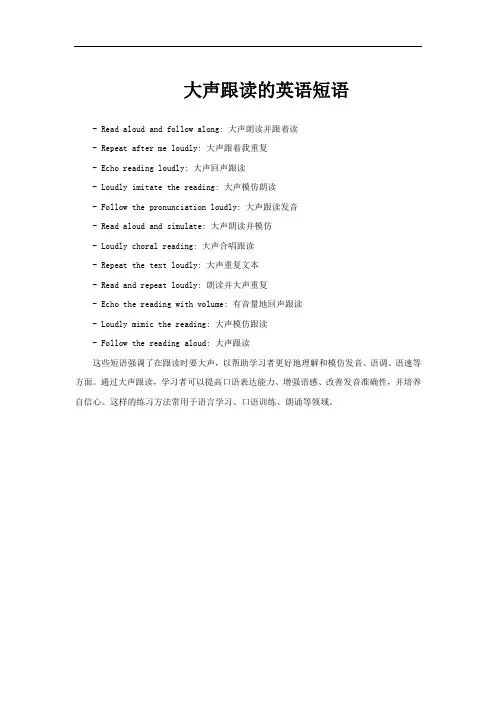
大声跟读的英语短语
- Read aloud and follow along: 大声朗读并跟着读
- Repeat after me loudly: 大声跟着我重复
- Echo reading loudly: 大声回声跟读
- Loudly imitate the reading: 大声模仿朗读
- Follow the pronunciation loudly: 大声跟读发音
- Read aloud and simulate: 大声朗读并模仿
- Loudly choral reading: 大声合唱跟读
- Repeat the text loudly: 大声重复文本
- Read and repeat loudly: 朗读并大声重复
- Echo the reading with volume: 有音量地回声跟读
- Loudly mimic the reading: 大声模仿跟读
- Follow the reading aloud: 大声跟读
这些短语强调了在跟读时要大声,以帮助学习者更好地理解和模仿发音、语调、语速等方面。
通过大声跟读,学习者可以提高口语表达能力、增强语感、改善发音准确性,并培养自信心。
这样的练习方法常用于语言学习、口语训练、朗诵等领域。
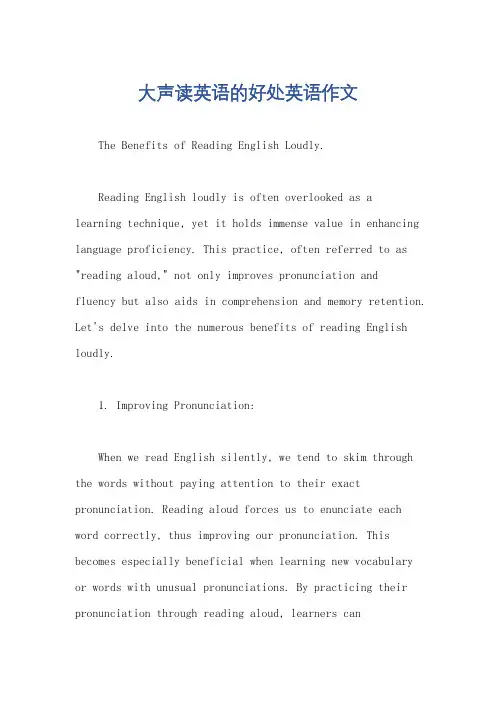
大声读英语的好处英语作文The Benefits of Reading English Loudly.Reading English loudly is often overlooked as alearning technique, yet it holds immense value in enhancing language proficiency. This practice, often referred to as "reading aloud," not only improves pronunciation andfluency but also aids in comprehension and memory retention. Let's delve into the numerous benefits of reading English loudly.1. Improving Pronunciation:When we read English silently, we tend to skim through the words without paying attention to their exact pronunciation. Reading aloud forces us to enunciate each word correctly, thus improving our pronunciation. This becomes especially beneficial when learning new vocabularyor words with unusual pronunciations. By practicing their pronunciation through reading aloud, learners canconfidently use these words in conversation.2. Enhancing Fluency:Reading English loudly helps to familiarize our mouths and tongues with the language, making it easier to speak fluently. As we repeatedly read aloud, we train our mouths to form the correct sounds and sequences, leading to smoother and more natural-sounding speech. This is especially useful for those who are learning English as a second language and may struggle with the flow and cadence of the language.3. Improving Comprehension:Reading aloud requires us to slow down and pay close attention to each word and sentence. This slow and deliberate reading helps us to better understand and internalize the content. As we read, we are forced to process the information more deeply, which leads to a better understanding of the text's meaning and context.4. Boosting Memory Retention:Reading English loudly stimulates multiple senses, making the information more memorable. The combination of hearing the words, seeing them written, and saying them aloud helps to create a stronger neural connection in the brain. This multisensory approach to learning not only improves memory retention but also makes the learning process more engaging and enjoyable.5. Improving Public Speaking Skills:Reading English loudly also helps to build confidence in public speaking. By practicing speaking in front of a mirror or to a group of people, learners can overcome stage fright and develop a more confident delivery. This practice also helps to identify and correct any speaking habits that may hinder clarity or effectiveness, such as stumbling over words or speaking too fast.6. Encouraging Regular Practice:Reading English loudly is a highly accessible and convenient practice that can be done anywhere, anytime. It does not require any special equipment or a partner; allyou need is a quiet space and a text to read. This ease of practice encourages regular engagement, which is crucialfor language learning. The more we practice, the better we become at speaking and understanding English.7. Increasing Motivation and Engagement:Reading English loudly can be a fun and rewarding experience. As learners see progress in their pronunciation, fluency, and comprehension, they are more likely to feel motivated and engaged with the learning process. This positive feedback loop can lead to even more significant improvements in English proficiency.In conclusion, reading English loudly offers a wide range of benefits that span from improving pronunciationand fluency to enhancing comprehension and memory retention. It is a simple yet effective practice that can be easily integrated into daily learning routines. By making the mostof this technique, learners can加速 their progress in learning English and enjoy the journey of language acquisition.。
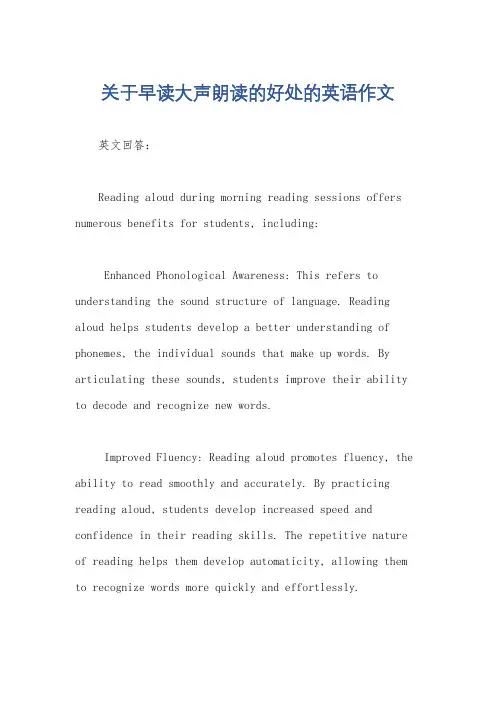
关于早读大声朗读的好处的英语作文英文回答:Reading aloud during morning reading sessions offers numerous benefits for students, including:Enhanced Phonological Awareness: This refers to understanding the sound structure of language. Reading aloud helps students develop a better understanding of phonemes, the individual sounds that make up words. By articulating these sounds, students improve their ability to decode and recognize new words.Improved Fluency: Reading aloud promotes fluency, the ability to read smoothly and accurately. By practicing reading aloud, students develop increased speed and confidence in their reading skills. The repetitive nature of reading helps them develop automaticity, allowing them to recognize words more quickly and effortlessly.Enriched Vocabulary: When students read aloud, they encounter a wider range of vocabulary than they might in silent reading. This exposure to new words helps expand their vocabulary, giving them a broader lexicon to use in their own writing and speaking.Enhanced Comprehension: Reading aloud facilitates comprehension by allowing students to hear and process the text in a different way than silent reading. By vocalizing the words, they are more likely to engage actively with the material, resulting in a deeper understanding of the content.Increased Motivation and Engagement: Reading aloud can be an engaging and motivating activity for students. They enjoy the social aspect of participating in a shared reading experience and the opportunity to share their interpretations of the text. This increased motivation can lead to a greater interest in reading and a desire to continue practicing.Improved Concentration and Focus: The act of readingaloud requires sustained attention and focus. Students must concentrate on the words and maintain their focusthroughout the reading. This helps develop their ability to stay focused and reduces distractions.Increased Confidence: Reading aloud builds confidencein students' reading abilities. As they gain fluency and accuracy, they develop a sense of accomplishment and pridein their reading. This increased confidence can motivate them to read more independently and explore differentgenres and authors.Social Development: Reading aloud in a group setting promotes social development and collaboration. Studentshave the opportunity to interact with their peers, share their ideas, and learn from each other. This collaborative experience fosters a sense of community and supports their social and emotional growth.Cultural Awareness and Appreciation: Reading aloud allows students to explore different cultures, perspectives, and experiences through literature. By engaging with textsfrom diverse authors, they gain a greater understanding of the world around them and develop empathy for others.Enjoyment and Relaxation: Reading aloud can be a relaxing and enjoyable activity. It provides a sense of calm and tranquility, helping students de-stress and escape from the demands of the day.中文回答:大声朗读能给学生带来许多好处,包括:提高语音意识,这指的是理解语言的音素结构。
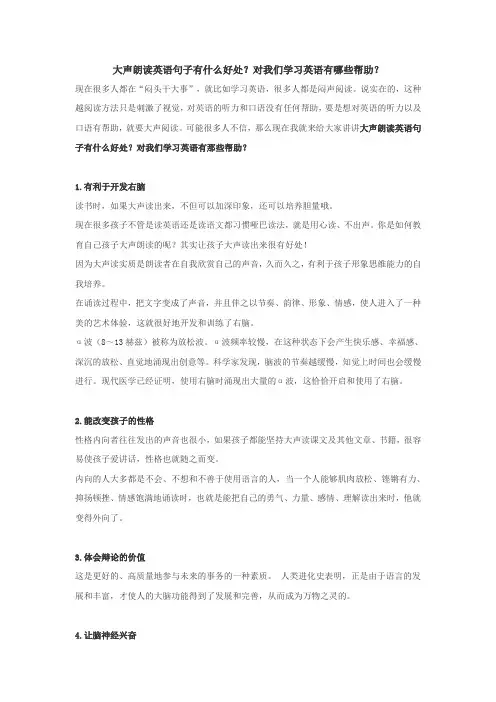
大声朗读英语句子有什么好处?对我们学习英语有哪些帮助?现在很多人都在“闷头干大事”,就比如学习英语,很多人都是闷声阅读。
说实在的,这种越阅读方法只是刺激了视觉,对英语的听力和口语没有任何帮助,要是想对英语的听力以及口语有帮助,就要大声阅读。
可能很多人不信,那么现在我就来给大家讲讲大声朗读英语句子有什么好处?对我们学习英语有那些帮助?1.有利于开发右脑读书时,如果大声读出来,不但可以加深印象,还可以培养胆量哦。
现在很多孩子不管是读英语还是读语文都习惯哑巴读法,就是用心读、不出声。
你是如何教育自己孩子大声朗读的呢?其实让孩子大声读出来很有好处!因为大声读实质是朗读者在自我欣赏自己的声音,久而久之,有利于孩子形象思维能力的自我培养。
在诵读过程中,把文字变成了声音,并且伴之以节奏、韵律、形象、情感,使人进入了一种美的艺术体验,这就很好地开发和训练了右脑。
α波(8~13赫兹)被称为放松波。
α波频率较慢,在这种状态下会产生快乐感、幸福感、深沉的放松、直觉地涌现出创意等。
科学家发现,脑波的节奏越缓慢,知觉上时间也会缓慢进行。
现代医学已经证明,使用右脑时涌现出大量的α波,这恰恰开启和使用了右脑。
2.能改变孩子的性格性格内向者往往发出的声音也很小,如果孩子都能坚持大声读课文及其他文章、书籍,很容易使孩子爱讲话,性格也就随之而变。
内向的人大多都是不会、不想和不善于使用语言的人,当一个人能够肌肉放松、铿锵有力、抑扬顿挫、情感饱满地诵读时,也就是能把自己的勇气、力量、感情、理解读出来时,他就变得外向了。
3.体会辩论的价值这是更好的、高质量地参与未来的事务的一种素质。
人类进化史表明,正是由于语言的发展和丰富,才使人的大脑功能得到了发展和完善,从而成为万物之灵的。
4.让脑神经兴奋这本身就能刺激孩子深入理解文章、书籍,人在诵读时口腔、肌肉、舌头、气流等的运动可以激活大脑多个区域的活动(特别是额叶、颞叶和顶叶)。
在诵读时还可以使大脑皮质的抑制和兴奋达到平衡,血流量及神经功能的调节处于良好的状态。

在线英语培训立刻说英语:
大声说英语让自己听到
英语学习的小技巧有很多,之前我们介绍过做记录学英语的方法,那么除了这个,其他的是什么?那就是让自己听到自己的声音,如何实现呢我们一起来一探究竟。
1.大声把英语说出来
饭要小口吃,英语要大声说。
所以强烈建议大家能够养成一个大声朗读英语的习惯,然后在试着运用腹式一口气的方法来练习,因为这样说出来的英语会让人感觉你更有底气,使你的英语听起来更加的优美。
在每天起床之后,把嘴巴张大,啊三到五分钟,这种方法能够帮助你锻炼腹式一口气。
另外,不但要练,还要善于使用,学到的东西再多,不会使用也都是白搭,所以,我还不但要回学英语,还要能够为自己创造机会使用英语。
你可以去找到一个学习英语的小伙伴,或者是自己对着天空,小鸟或者镜子来练习,经常练习,才能够把这些表达记清楚,等到你真正会用的时候,这些知识才真正变成你的了。
2.给自己录音
要学会给自己录音。
在学习一篇文章的朗读时,首先要精听文章,然后一遍一遍地去跟读,拿着自己的发音和原版的发音想比照,找到自己的录音和原版中的不同之处,然后针对不同的地方针对性的多次练习,直到自己的发音和原版中的一样为止。
要耐着性子,不可慌乱,把一个录用完全学会之后,在开始学习下一个。
在模仿的时候也要掌握方法,做到听时不读,读时不停,不论做什么都要专注,这样才能取得更好的效果。
总之,学习英语是一个慢慢前进的过程,你可能一天,一个星期,甚至是一个月都看不到自己的进步,但是放弃,只要方法是对的,就坚持下去,因为时间看得见。
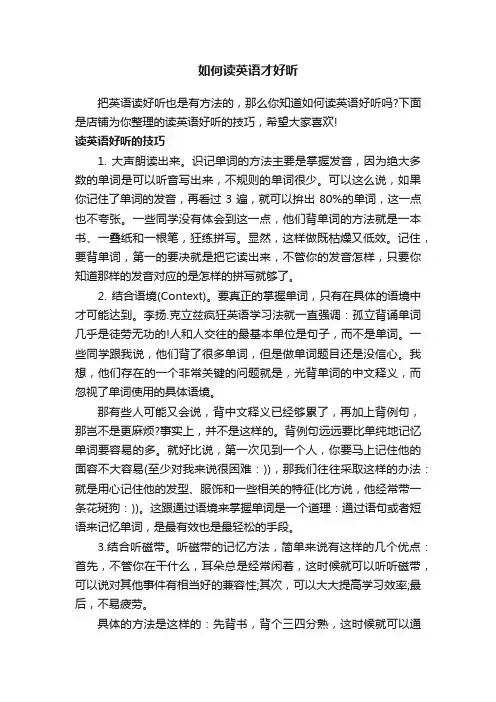
如何读英语才好听把英语读好听也是有方法的,那么你知道如何读英语好听吗?下面是店铺为你整理的读英语好听的技巧,希望大家喜欢!读英语好听的技巧1. 大声朗读出来。
识记单词的方法主要是掌握发音,因为绝大多数的单词是可以听音写出来,不规则的单词很少。
可以这么说,如果你记住了单词的发音,再看过3遍,就可以拚出80%的单词,这一点也不夸张。
一些同学没有体会到这一点,他们背单词的方法就是一本书、一叠纸和一根笔,狂练拼写。
显然,这样做既枯燥又低效。
记住,要背单词,第一的要决就是把它读出来,不管你的发音怎样,只要你知道那样的发音对应的是怎样的拼写就够了。
2. 结合语境(Context)。
要真正的掌握单词,只有在具体的语境中才可能达到。
李扬.克立兹疯狂英语学习法就一直强调:孤立背诵单词几乎是徒劳无功的!人和人交往的最基本单位是句子,而不是单词。
一些同学跟我说,他们背了很多单词,但是做单词题目还是没信心。
我想,他们存在的一个非常关键的问题就是,光背单词的中文释义,而忽视了单词使用的具体语境。
那有些人可能又会说,背中文释义已经够累了,再加上背例句,那岂不是更麻烦?事实上,并不是这样的。
背例句远远要比单纯地记忆单词要容易的多。
就好比说,第一次见到一个人,你要马上记住他的面容不大容易(至少对我来说很困难:)),那我们往往采取这样的办法:就是用心记住他的发型、服饰和一些相关的特征(比方说,他经常带一条花斑狗:))。
这跟通过语境来掌握单词是一个道理:通过语句或者短语来记忆单词,是最有效也是最轻松的手段。
3.结合听磁带。
听磁带的记忆方法,简单来说有这样的几个优点:首先,不管你在干什么,耳朵总是经常闲着,这时候就可以听听磁带,可以说对其他事件有相当好的兼容性;其次,可以大大提高学习效率;最后,不易疲劳。
具体的方法是这样的:先背书,背个三四分熟,这时候就可以通过反复的听磁带来强化记忆。
现在,有的单词书配有磁带,有的没有;其实自己就可以录这样的磁带。
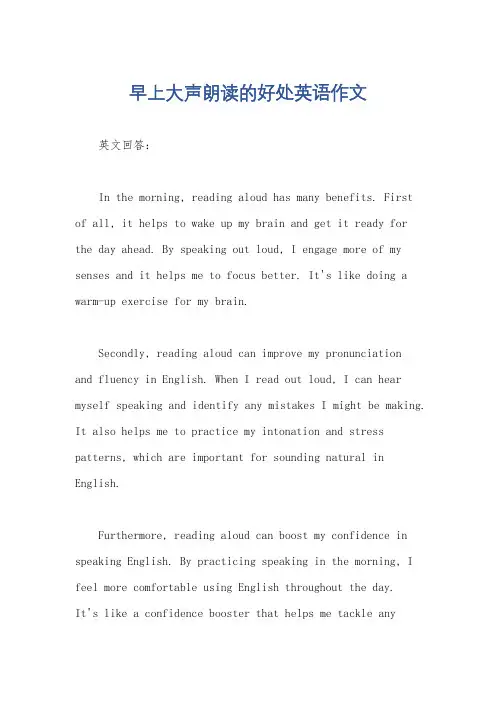
早上大声朗读的好处英语作文英文回答:In the morning, reading aloud has many benefits. Firstof all, it helps to wake up my brain and get it ready for the day ahead. By speaking out loud, I engage more of my senses and it helps me to focus better. It's like doing a warm-up exercise for my brain.Secondly, reading aloud can improve my pronunciationand fluency in English. When I read out loud, I can hear myself speaking and identify any mistakes I might be making. It also helps me to practice my intonation and stress patterns, which are important for sounding natural in English.Furthermore, reading aloud can boost my confidence in speaking English. By practicing speaking in the morning, I feel more comfortable using English throughout the day.It's like a confidence booster that helps me tackle anychallenges that come my way.For example, I used to struggle with pronouncingcertain words correctly. But after incorporating reading aloud into my morning routine, I noticed a significant improvement in my pronunciation. I also feel more confident when speaking in English, whether it's in a meeting at work or having a casual conversation with a friend.Overall, reading aloud in the morning is a simple yet effective way to improve my English skills and start the day off on the right foot.中文回答:早上大声朗读有很多好处。
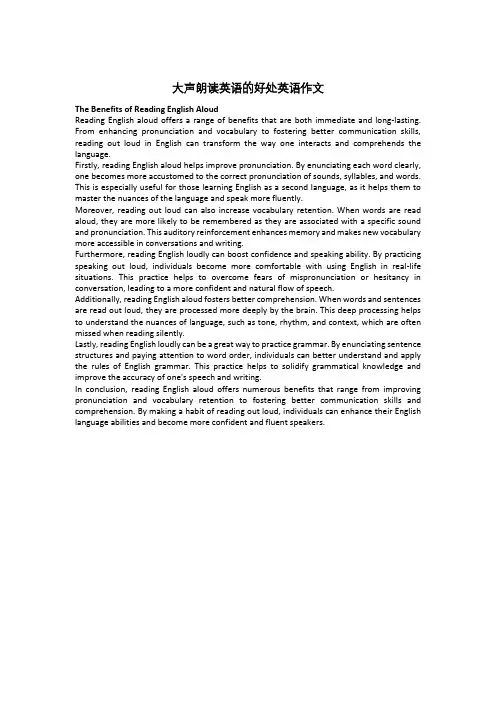
大声朗读英语的好处英语作文The Benefits of Reading English AloudReading English aloud offers a range of benefits that are both immediate and long-lasting. From enhancing pronunciation and vocabulary to fostering better communication skills, reading out loud in English can transform the way one interacts and comprehends the language.Firstly, reading English aloud helps improve pronunciation. By enunciating each word clearly, one becomes more accustomed to the correct pronunciation of sounds, syllables, and words. This is especially useful for those learning English as a second language, as it helps them to master the nuances of the language and speak more fluently.Moreover, reading out loud can also increase vocabulary retention. When words are read aloud, they are more likely to be remembered as they are associated with a specific sound and pronunciation. This auditory reinforcement enhances memory and makes new vocabulary more accessible in conversations and writing.Furthermore, reading English loudly can boost confidence and speaking ability. By practicing speaking out loud, individuals become more comfortable with using English in real-life situations. This practice helps to overcome fears of mispronunciation or hesitancy in conversation, leading to a more confident and natural flow of speech.Additionally, reading English aloud fosters better comprehension. When words and sentences are read out loud, they are processed more deeply by the brain. This deep processing helps to understand the nuances of language, such as tone, rhythm, and context, which are often missed when reading silently.Lastly, reading English loudly can be a great way to practice grammar. By enunciating sentence structures and paying attention to word order, individuals can better understand and apply the rules of English grammar. This practice helps to solidify grammatical knowledge and improve the accuracy of one's speech and writing.In conclusion, reading English aloud offers numerous benefits that range from improving pronunciation and vocabulary retention to fostering better communication skills and comprehension. By making a habit of reading out loud, individuals can enhance their English language abilities and become more confident and fluent speakers.。

越来越浓,甚至在多年之后他们都能记得我当初给他们上课的点点滴滴。
不懈的努力,有了一些回报。
这个班级的大部分同学能够在课堂的后一半时间里高高兴兴地学英语课本上的内容了。
后来,我发现不管是这个普高班还是另外两个职高班的同学听起英语语法来都有点吃力,也难以保持专注,他们做题的错误率也很高。
我就学习当时刚刚传播开来的“李阳疯狂英语”,领着大家放开喉咙、大声朗读课文和对话,通过培养学生自信的精神和全身心投入的态度,将学习英语过程化为一种“集自我认知、行动推进和日常积累为一体的热情口头操练”。
根据“句子中心论”的观点,我们在课堂上划分句子结构,然后由老师或学生代表领着大家高声、分语段、重复地读背这些句子。
如To our surprise,/the honest man /devoted all his life /to working on the research /until he achieved/ the most important result. 尽管这样的语段划分不一定符合语法规则,却真的有利于学生朗朗上口地读出来。
在反复诵读这些句子之后,我们及时进行检查(默写和做题),发现学生的学习效果远比看老师认真地讲要好。
慢慢地,我将句子扩大为短文,选择一些精干的、“全身都是宝贝”的高营养短文进行集中式读背,学生的掌握能力也一再提升。
20年,每次接到一个“蔡氏英语学习法”,下课后还围着。
那一个个长长的尾音,响彻了校园。
很都会报以惊叹的一笑,说“蔡氏。
我们的教学成绩也一直稳步领先,我们在全市继续居于第一梯队,的真正成绩不仅是体现在考试中,用。
每一个新班级的第一节课,我都会郑重地对学生宣布:“只要你们信任老师,跟着老师一起大声朗读,一年后的你们就会让人刮目相看。
”事实上,很多老师到我们班级听课后都会深有感触地说:“你们的初三学生都还有那么高的学习热情,朗读、回答那么响亮,举手那么频繁,真是想不到!”每年初中毕业以后,都会有学生专程来看我,他们说:“蔡老师,我们上学12年了,你是我们遇到的一个奇怪的老师,你跟我们开玩笑时不分大小,你没有太多的唠叨,但是你用大声地朗读和背诵让我们找回了自信、发泄了情感、发现了潜力,最重要的是掌握了英语的学习诀窍。
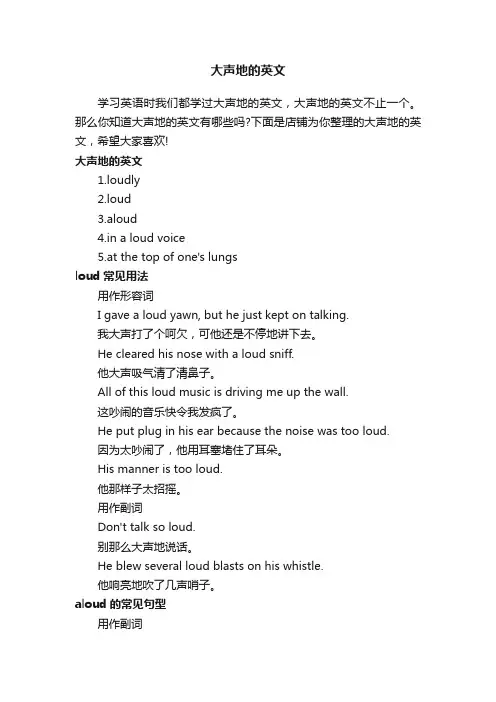
大声地的英文学习英语时我们都学过大声地的英文,大声地的英文不止一个。
那么你知道大声地的英文有哪些吗?下面是店铺为你整理的大声地的英文,希望大家喜欢!大声地的英文1.loudly2.loud3.aloud4.in a loud voice5.at the top of one's lungsloud常见用法用作形容词I gave a loud yawn, but he just kept on talking.我大声打了个呵欠,可他还是不停地讲下去。
He cleared his nose with a loud sniff.他大声吸气清了清鼻子。
All of this loud music is driving me up the wall.这吵闹的音乐快令我发疯了。
He put plug in his ear because the noise was too loud.因为太吵闹了,他用耳塞堵住了耳朵。
His manner is too loud.他那样子太招摇。
用作副词Don't talk so loud.别那么大声地说话。
He blew several loud blasts on his whistle.他响亮地吹了几声哨子。
aloud的常见句型用作副词用作状语No sensible person will read aloud in the library.识大体的人是不会在图书馆里出声读书的。
She has very good pronunciation when she reads aloud.她朗读的时候发音很好。
It is far better to read aloud than to read in silence.朗读比默读好。
He practises reading aloud every morning.他每天早晨练习朗读。
Please read the story aloud.请诵读这个故事。
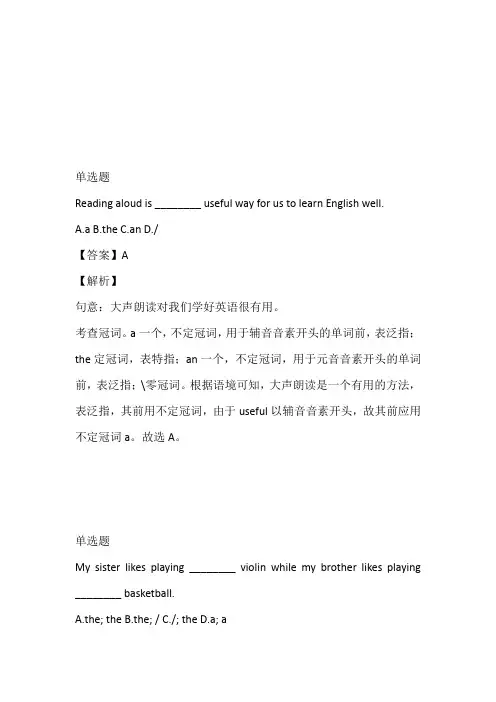
单选题Reading aloud is ________ useful way for us to learn English well.A.aB.theC.anD./【答案】A【解析】句意:大声朗读对我们学好英语很有用。
考查冠词。
a一个,不定冠词,用于辅音音素开头的单词前,表泛指;the定冠词,表特指;an一个,不定冠词,用于元音音素开头的单词前,表泛指;\零冠词。
根据语境可知,大声朗读是一个有用的方法,表泛指,其前用不定冠词,由于useful以辅音音素开头,故其前应用不定冠词a。
故选A。
单选题My sister likes playing ________ violin while my brother likes playing ________ basketball.A.the; theB.the; /C./; theD.a; a【答案】B【解析】句意:我姐姐喜欢拉小提琴,而我哥哥喜欢打篮球。
考查冠词。
the定冠词;a不定冠词,用于辅音音素开头单词前;/零冠词。
violin小提琴,play后接乐器类名词时,名词前前应加定冠词the,即play the violin拉小提琴;basketball篮球,play后接球类名词时,球类运动前不加冠词,即play basketball打篮球。
故选B。
单选题My mum always gets up ________ six ________ Monday morning and cooks breakfast for me.A.at; onB.in; atC.on; atD.at; in【答案】A【解析】句意:我妈妈总是在星期一早上六点起床为我做早餐。
考查时间介词。
in用在年、月、季节、世纪等前或泛指的上午、下午、晚上前;on用在具体的某一天或具体某一天的上午、下午、晚上前;at用在具体的时刻前。
“我的妈妈总是在星期一早上六点起床”,其中six表具体的时刻,其前用介词at;Monday morning表具体某一天的上午,其前用介词on。
大声读英语的好处英语作文English: One major benefit of reading English aloud is that it helps improve pronunciation and intonation. When we read aloud, we are able to practice the correct sounds and stress patterns of English words. This helps us become more confident and fluent speakers. Additionally, reading aloud allows us to hear and imitate native English speakers, helping us develop a more authentic accent. Another advantage of reading English aloud is that it enhances our understanding and retention of the language. By engaging our senses of sight, hearing, and speech, we create a stronger connection between the written and spoken word. This, in turn, improves our comprehension skills and ability to remember vocabulary and grammar rules. Moreover, reading aloud can boost our overall language skills. It helps us become more familiar with the natural flow of English sentences, sentence structures, and common phrases. This exposure to the language in its spoken form can also improve our writing skills as we learn to mimic the appropriate style and tone. Lastly, reading aloud can be an enjoyable and engaging way to learn English. It makes the learning process more interactive and fun, allowing us to immerse ourselves in the language and experience itsrhythm and beauty. So, whether it is through reading books, poems, or even newspaper articles, reading aloud allows us to actively practice and internalize the language skills needed for effective communication.中文翻译: 大声朗读英语的一个主要好处是可以帮助提高发音和语调。
大声读英语怎么说学习英语,读英语的时候就是要大声读出来,那么你知道大声读的英语怎么说吗?今天店铺在这里为大家介绍大声读的英语表达,欢迎大家阅读!大声读的英语释义read aloud大声读的英语例句如果你的孩子愿意的话,不管多大年龄,都不要害怕大声读出来。
If your child is willing, whatever his or her age, don't be afraid to read aloud.第二本是本故事书《邻家的中国孩子》,开始是母亲大声读给我听,后来我能自己读了。
The second was a storybook read aloud to me by my mother before I could readmyself.有时候如果你对论点有问题,大声读出来会变得容易。
Sometimes its much easier if you ever having trouble with an argument tryreading out aloud.比如你在魔镜面前晃动一个贴过邮票的咖啡杯,可以让电脑为你大声读新闻。
For example waving a stamped coffee mug over the mir:ror might trigger yourcomputer to read the news aloud to you.如果你的孩子大到不需要听别人念书了(有些人认为没有谁会大到不需要听别人念书),那么偶尔大声读一些报纸上的文章吧。
If you're child is too old to be read to (some would suggest that no one is too oldto be read to), just read articles aloud from the newspaper from time to time.你们也许注意到了我很喜欢大声读这些小说给你们听,我很喜欢读一些片段。
大声朗读的好处英语作文英文回答:Benefits of Reading Aloud.Reading aloud is a simple yet powerful practice that offers a multitude of benefits for both children and adults. It has the ability to improve comprehension, enhance vocabulary, boost confidence, and foster a love of literature.Enhanced Comprehension.When individuals read aloud, they engage multiple senses, including auditory and visual, which helps to strengthen memory and understanding. The act of vocalizing words forces the reader to slow down and pay attention to the text, increasing their ability to grasp the meaning and retain information.Expanded Vocabulary.Reading aloud exposes individuals to a wider range of words and phrases than they may encounter in silent reading. By hearing words spoken aloud, learners can develop abetter understanding of their pronunciation and usage, enriching their vocabulary and improving their communication skills.Increased Confidence.Reading aloud in front of others can be daunting, butit is a valuable practice for building confidence. It provides an opportunity for individuals to practicespeaking clearly and confidently, which can translate to improved communication skills in all aspects of life.Fostering a Love of Literature.Reading aloud often involves sharing stories and poems with others, creating a shared experience that can ignite a love of literature. It allows individuals to connect withthe characters, themes, and emotions presented in the text, fostering an appreciation for the power of storytelling.Additional Benefits.Beyond the core benefits mentioned above, reading aloud offers several other advantages:Improved fluency and pronunciation.Enhanced critical thinking skills.Increased attention span.Reduced stress and anxiety.Promotes social interaction and bonding.中文回答:大声朗读的好处。
学好英语的十个方法
1. 每天保持英语练习:坚持每天练习英语听、说、读、写的各个方面,保持良好的语感和口语表达能力。
2. 多听英语:听英语广播、英语歌曲和英语电影,增强对语言的感知能力,提高听力和理解能力。
3. 大声朗读英语:选择英语文章或短文,大声朗读可以增强口语流利度和语音准确性。
4. 参加英语角或语言交流活动:与其他英语学习者互动交流,提高口语表达能力和听力反应能力。
5. 创造英语语言环境:用英语标注家具、做饭菜谱或者与朋友进行英语交流,创造一个英语环境,潜移默化地提高语言运用能力。
6. 多读英文原版书籍和文章:阅读英文原版书籍、报纸或杂志,拓宽词汇量,增进阅读理解能力。
7. 利用网络资源:利用网络上的英语学习资源,例如英语学习网站、英语听力材料和英语学习应用程序,随时随地进行练习。
8. 多观看英文电影和英语节目:观看英文电影和英语节目,提升听力水平,培养听懂口音和上下文的能力。
9. 找一个英语学习伙伴:与英语学习伙伴互相练习口语,相互勉励,共同进步。
10. 参加英语培训班或私人辅导:参加专业的英语培训班或找
一位专业的英语老师进行私人辅导,获得更系统和专业的指导。
The Benefits of Loud Reading: A Bridge toLanguage MasteryIn the world of learning, loud reading often goes unnoticed as a vital practice, yet it holds immense potential in enhancing language skills and personal development. This essay delves into the numerous advantages of loud reading, exploring how it can act as a catalyst for language proficiency and personal growth.Firstly, loud reading improves pronunciation and speaking skills. By articulating words aloud, learners are able to refine their pronunciation, ensuring that each syllable is pronounced correctly. This, in turn, enhances their speaking ability, as they become more confident and fluent in expressing themselves. This practice is particularly beneficial for those learning a new language, as it helps them to internalize the sound patterns and intonations of the language, making them sound more natural and authentic.Secondly, loud reading enhances comprehension and memory. When we read aloud, we engage multiple senses simultaneously: we see the words, hear the sounds, and feelthe vibrations. This multisensory approach improves comprehension, as it allows us to process the information more deeply. Additionally, loud reading helps to固化记忆, as the repetition of words and phrases strengthens neural connections in the brain, leading to longer-lasting memory retention.Moreover, loud reading fosters a positive learning environment. When students read aloud in a classroom setting, it creates a shared experience that encourages active participation and collaboration. This positive learning environment fosters a sense of community and motivation, making learning more enjoyable and effective. Similarly, at home, reading aloud to children can foster a love for reading and learning, instilling a lifetime habit of continuous learning.Lastly, loud reading acts as a stress reliever and mood enhancer. The rhythmic flow of words and the repetition of sounds can have a calming effect on the mind, helping to relieve stress and anxiety. Reading aloud also releases endorphins, the "happy hormones," which boost our mood and overall well-being. This makes loud reading an idealactivity for busy individuals looking to unwind and rejuvenate.In conclusion, loud reading is a powerful tool for language mastery and personal growth. It improves pronunciation and speaking skills, enhances comprehension and memory, fosters a positive learning environment, andacts as a stress reliever and mood enhancer. By embracing this simple yet effective practice, we can unlock the full potential of our language abilities and foster personal development in a holistic manner.**大声朗读的好处:通往语言精通的桥梁**在学习的世界里,大声朗读往往被忽视,被视为一种重要的实践,但它对于提高语言技能和个人发展具有巨大的潜力。
在学校大声朗读作文英语Loud Reading in School。
In school, loud reading is an important activity that helps students improve their English language skills. It is an effective way to enhance reading comprehension, pronunciation, and speaking abilities. Loud reading can be done individually or in a group, and it can be done withany type of text, including novels, short stories, poems, and articles.When students read out loud, they engage in active learning. They are forced to pay attention to the words and their meanings, which helps them understand the text better. Loud reading also helps students develop theirpronunciation skills. By hearing themselves speak, they can identify and correct errors in their pronunciation, intonation, and stress.Moreover, loud reading is a great way to improvespeaking abilities. It helps students become more confident in their ability to express themselves orally. Bypracticing reading out loud, they learn how to articulate their thoughts and ideas more clearly and effectively. This will benefit them not only in school but also in their future careers.In addition, loud reading can be a fun and engaging activity that promotes social interaction and teamwork. When students read aloud in a group, they can share their thoughts and opinions about the text and learn from each other. This can help build a sense of community and promote a positive learning environment in the classroom.To make the most of loud reading in school, teachers should encourage students to practice it regularly. They can assign reading assignments that require students to read out loud and provide feedback on their pronunciation and speaking abilities. Teachers can also incorporate activities that involve reading aloud in group discussions or debates.In conclusion, loud reading is a valuable activity that can help students improve their English language skills. It is an effective way to enhance reading comprehension, pronunciation, and speaking abilities. By practicing loud reading regularly, students can become more confident and proficient in their use of the English language.。
大声“读”出好英语-英语论文
大声“读”出好英语
江苏省淮安市楚州中学范媛媛
学英语的人都知道要想学好英语要大声朗读,然而又有多少人真正重视朗读呢?我发现有很大一部分高中生读英语总是没有激情,读不出声音。
不读出声,不知道发音是否准确;不读出声,对于英语学习无法培养出语感;不读出声,无法使自己长时间保持注意力集中。
一、朗读的作用
(一)提高学生的记忆力
朗读是记忆的基础,朗读的过程要经过准确地识读单词,然后通过视觉神经传到大脑神经中枢,大脑神经中枢再指挥发音系统准确地发出声音。
在朗读过程中,视觉准确捕捉单词的能力、视觉神经准确而迅速的传导能力、人脑神经系统对发音系统的指挥调控能力等多种能力同时得到了训练。
再经过多次重复发音,对应的发音组合就会形成牢固的循环记忆,使记忆的效果远远高于默读的效果。
(二)培养学生的学习兴趣
兴趣是最好的老师,兴趣是点燃智慧的火花,兴趣是学习知识的动力。
激发和培养学生学习英语的兴趣是搞好英语教学的基础,而大声朗读就能够达到培养并长期保持学生学习英语的兴趣这一效果。
声情并茂的朗读可以促使学生与作者情感交融,可以增强学生对文章主题和写作风格的领悟和理解。
学生再把从朗读中获得的知识记住并运用于实践,在学习中获得成就感,增强其自信心,增添了学习英语的兴趣,从而让学生慢慢由“被动学”转变为“主动学”。
(三)积累词汇和扩大知识面
孤立的单词不容易记忆,而当它在句子里、文章中时,联系上下文就比较容易记住。
课文中的重要词语、句型、段落,课外读物中碰到的名言名句、优秀的英文小诗和短文等,都是学习者朗读的好材料。
朗读能帮助学生在大脑中存储大量的知识,包括词汇、句法、社会文化知识、科普知识、逻辑推理知识等。
学生不必刻意去钻研语法,只要经常大声朗读并注意模仿运用,到一定程度,就会自然而然地记住所读的内容并将其说出来。
疯狂诵读的结果使学生“出口成章”,它所积累的大量词汇、丰富多彩的语言表达形式,对于我们的写作具有直接的模仿和借鉴作用。
(四)提高学生的听说读写能力
朗读要求学生仔细看着语言材料,大脑想着其发音,然后专注地念出来,再通过颅骨把声音传达到听觉神经,大脑记录下送达的信息,以便以后在学习中运用自如。
朗读是生理活动向心理活动的转化过程,它能够体现出英语教学的内化真谛,大量准确的朗读能够促进听力和口语的进一步完善,长期保持大声朗读更能够充分提高阅读和写作水平。
二、提高朗读作用的策略
(一)大声朗读,经常朗读,形成良好的朗读习惯
背单词、学好英语的第一要诀就是把它读出来,而朗读是学好英语最简易的方法。
学好英语不是一朝一夕的事情,它需要有持之以恒的精神,光靠阅读理解和大量做题是学不好一门语言的。
英语既然是一门语言,就需要经常地用于口头交际。
朗读不需要很多技术的指导,学生只要课上会读单词,课下的朗读就能自己进行,而且朗读时间可以自己把握,学生还可以借助朗读声音大小和语音、语调,抒发自己学习英语的情感。
因此,朗读是一个比较自主、简易的英语学习方法。
别忘
了李阳老师的疯狂英语的教导——想学好英语,要从朗读和背诵英语单选和短文开始。
疯狂英语的精髓就是让大家能张开嘴去说英语,读到位,这样才有训练的效果。
所以,只要经常朗读、大声朗读,逐渐形成良好的朗读习惯,你一定会收获很大。
(二)用心朗读,努力模仿
读不仅仅是为了把所学的东西背下来,同时也是观察和模仿的过程。
语言学习必须通过模仿才能学会,朗读也是。
模仿是一种需要反复进行的实践活动。
语言如同音乐,吐字与音调升降过程中有许多细小的修饰,并不是一两遍就可以听得出、学得会的,必须反复地听,加深印象。
听得越多,品味越深,才能学得更像。
教师可以选择发音准确、难易适度、较为简短的录音材料供学生模仿。
学生便从不断地模仿中学会注意词句的准确性,段落朗读也就有了坚实的基础。
(三)朗读时要做到眼、口、耳、脑并用
眼睛注视所读的材料,嘴巴大声地读,耳朵同时又聆听朗读的内容,大脑再负责记忆。
这是一个不断循环往复的过程,一次朗读由于多种感官的同时介入,有着成倍的效果。
我们大多数人都有这样的体会,读中学、小学时学的单词、课文经久不忘,而成年后看的一些东西却不易留下印象,当中一个很重要的因素就是文字输入大脑的方法发生了很大的变化。
上学时候的文章多数是通过朗读的方法输入大脑的,朗读把眼口耳脑四者密切结合起来,所以记忆效果很好。
而随着年龄增长,阅读量增加了,但是朗读却大大减少了,如此一来,记忆的牢固程度就会减弱。
科学研究也表明,通过调动人的多种器官眼、口、耳输入大脑的信息要比单纯通过视觉储存到大脑的信息记忆的要牢固。
总而言之,要想学好英语,我们要在平时的教学工作中注重抓“朗读”教学,并
利用晨早读时间主抓英语朗读。
可以是老师带领学生朗读,也可以是学生之间进行朗读竞赛,还可以进行分组朗读等多种形式。
一段时间之后,学生就会发现大声真能“读”出好英语。
(责任编辑:李娜)。